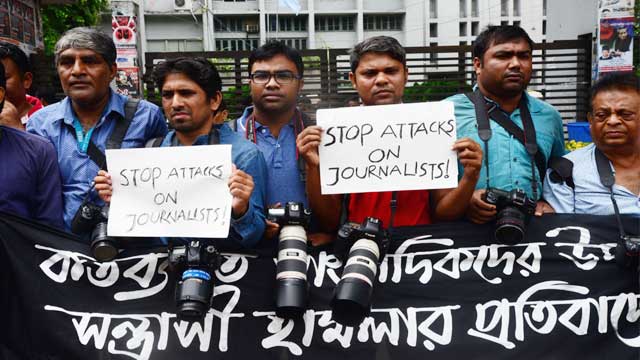Global freedom of expression has been as its lowest for a decade, and Bangladesh is no exception with record numbers of attacks on journalists and cases of “legal harassment”, many perpetrated by state and political actors, says a UK-based rights body report.
Repressive responses to street protests are contributing to the decline in freedom of expression around the world, reads the Global Expression Report 2018-19 released on December 2.
The rights organisation, Article 19, has prepared the report based on qualitative data and analysis of last year’s events and trends.
The Global Expression Report, covering 161 countries, conducted a study on 39 indicators, and applies them across five pillars of freedom of expression: transparency, civic space, protection, digital, and media.
The report says Bangladesh scores significantly below the regional average in digital, protection, and transparency --three essential components of freedom of expression.
The report mentions that the country saw a corresponding rise in censorship and violence in 2018, which was an election year. More than 50 websites were blocked, mobile operators were ordered to slow down their internet bandwidth speed and 30 masked individuals attacked 12 journalists on December 24 in 2018, it says.
It says there were also reports of mass arrests of opposition politicians, and 3,00,000 politically motivated criminal cases were filed against opposition party members and supporters. The ruling Awami League dominated the election, though the opposition rejected the results and called for a new vote.
In June, writer and publisher Shahjahan Bachchu, who was known for his religious non-conformism, running publishing house “Bishakha Prokashoni”, and editing online weekly “Amader Bikrampur”, was shot dead.
The Digital Security Act was passed, dashing hopes of an opening for online expression after the hard-won repeal of the “notorious” section 57.
“The new law provides for life sentences for using digital devices to spread negative propaganda against the ‘Liberation War’ or the ‘Father of the Nation’; up to five years’ imprisonment for deliberately publishing defamatory or false or distorted content; and up to 10 years’ imprisonment for hurting religious sentiments, hate speech, or causing deterioration of law and order,” reads the report.
The report mentions that there was public outrage at the new provisions -- particularly the provision of the new law, which classes gathering information from inside government offices as espionage, carrying a 14-year jail sentence. Many took to Twitter to defend investigative journalism, declaring #IAmaSpy.
It also points out that broadcast media was also restricted in October, when the National Broadcast Act was passed, providing sentences of up to three years in prison for “going against the spirit” of the 1971 Liberation War, or airing “misleading or false” information.
In August, the country saw major protests, centred around road safety.
Internationally-acclaimed photographer Shahidul Alam was subjected to 100 days of arbitrary detention for posting footage of protests on Facebook.
“Police and armed men injured more than 40 media workers. No cases were filed in connection with this violence, despite pressure from ministers and substantial video and photo evidence; not one perpetrator has even been officially identified,” the report says.
Talking to The Daily Star, Faruq Faisel, regional director of Article 19 for Bangladesh and South Asia, said the goal no 16 of SDGs deals with freedom of expression.
“Though we’re noticing that the government has made good progress in attaining other goals of SDGs, freedom of expression is deteriorating in the country,” he said, adding that, “The government is trying to attack the media in various ways.”
He suggested forming an independent commission to monitor and control fake news and spread of rumour in social media to curtail excessive control of government on freedom of expression.





